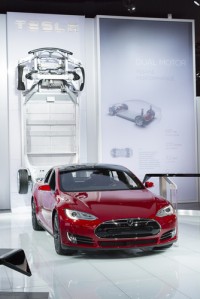Tesla responds to lawsuit by claiming it has no duty to design a fail-safe car

A Tesla Model S. Ed Aldridge / Shutterstock.com
A lawsuit against Tesla, the maker of high-end fully electric cars, alleges that its Model X and Model S vehicles have a software flaw that creates unintended acceleration that lead to accidents, Ars Technica reported Monday—but Tesla “disputes that there is a legal duty to design a fail-safe car.”
The proposed class action, filed March 31 in federal court in Central California, said there have been 26 total incidents in which the affected models have suddenly accelerated at full speed while their drivers were parking or driving at slow speeds. Of those 26 incidents, 22 resulted in a crash. One of those crashes is documented with pictures inserted into the complaint. Plaintiff Ji Chang Son alleges that while he was parking his car in his garage, it suddenly accelerated into the garage’s back wall, crashing partially through it and into his living room.
The lawsuit alleges that this is a result of design defects—and that even if every incident was caused by human error, Tesla has a legal responsibility to create a “fail-safe” that would stop the acceleration. It notes that despite receiving substantial reports on unintended acceleration, Tesla has not fixed the problem nor even warned consumers.
“Tesla’s lack of response to this phenomenon is even more confounding when the vehicle is already equipped with the hardware necessary for the vehicle’s computer to be able to intercede to prevent unintended acceleration,” the complaint said.
Tesla’s motion to dismiss and/or strike, also filed last Friday, largely argued for dismissal of specific claims in the lawsuit—claims under specific state consumer protection laws, as well as warranty claims that the automaker said are not covered by its warranty.
But it also argues that automakers have no duty to design a fail-safe into their vehicles, as the plaintiffs request—something it said “no manufacturer has ever done.” And it said its data on unintended acceleration crashes shows that all the incidents it knows of were caused by human error.
A hearing is set for May 1 in federal court in Santa Ana, California.
As Ars Technica noted, the last time an automaker was accused of selling defective cars with unintended acceleration problems, it was Toyota. Toyota ultimately paid $29 million to states and $1.2 billion in criminal penalties to the Department of Justice to settle related claims.



